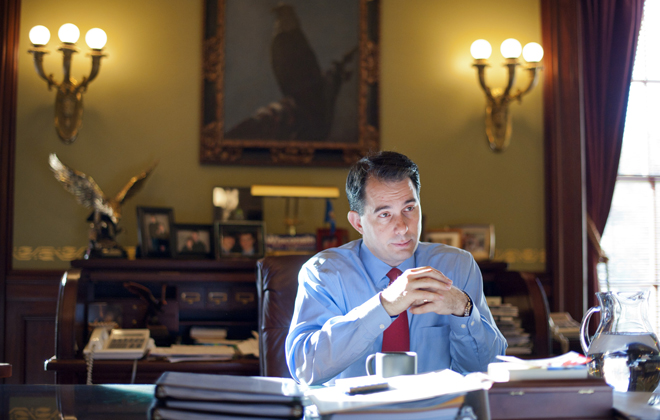Updated June 5, 11:20 p.m. ET
Republican Gov. Scott Walker has won the Wisconsin governor’s recall over Democratic Milwaukee Mayor Tom Barrett, holding onto his job after his push to slash collective bargaining rights for public employees sparked intense statewide backlash.
Walker’s win caps a chaotic year in Wisconsin, marked by heated demonstrations, endless campaigning and a flood of outside money, all of which vaulted the state from ordinary battleground to Ground Zero of the national political debate — and elevated Walker to national superstardom among the Republican faithful.
Walker was favored from the outset, bolstered by an enormous cash advantage, and a firewall of support from national Republican figures.
With 40 percent of precincts reporting, Walker has 59 percent of the vote, and Barrett has 40 percent, according to the Associated Press. The result is very likely to narrow, with more liberal areas typically reporting later in Wisconsin. Walker has been projected the winner by multiple news organizations.
“This is such a tremendous victory for Wisconsin taxpayers,” said Ciara Matthews, Walker campaign communications director, in a statement. “Today, Wisconsin voters have told the nation they stand with Governor Walker because he stands with them.”
Walker said: “Bringing our state together will take some time, but I hope to start right away. It is time to put our differences aside and figure out ways that we can move Wisconsin forward.”
Barrett told supporters at his concession speech: “And what we have seen over the last 16 months, is we have seen this democracy come alive. To those of you who fought, who obtained signatures, who stood out in the cold, who did what you thought was right — never, ever stop doing what you think is right. That’s what makes this such a great country.”
Walker previously faced Barrett in 2010, when he won the open-seat contest by a 52 percent to 47 percent margin.
The catalyst for the uproar that forced the recall was Walker’s legislation stripping most public-sector workers of collective bargaining rights — and the ensuing protests that filled the state Capitol and inspired demonstrations across the country, along with a high-profile effort by the minority Democrats to flee the state and block a three-fifths budget quorum to prevent the bill from moving forward. After Republicans found a way around the roadblock and passed the bill, Democrats initiated the first round of state Senate recalls, which took place in August 2011 and attracted tens of millions of dollars in political spending from both sides.
The results were a mixed bag. Democrats picked up two Senate seats, but were not the one more they needed to deprive Republicans of the majority. Out of the recall campaigns that were waged by both parties, four incumbent Republicans and three Democrats retained their seats, while two Republicans lost to Democratic challengers.
Democrats nonetheless sensed political blood was in the water, and quickly began laying the groundwork for an effort to recall Walker himself — an option that was only possible, under Wisconsin’s recall law, once an elected official has served at least one year of his current term.
And this new election saw a huge flood of money, as well. Walker raised over $30 million for the election — aided by the fact that he was able to take in unlimited donations during the 60-day window when petitions were collected — compared to just under $4 million for Barrett. Combined with interest group spending, the total GOP advantage over the Democrats was $47 million to $19 million.
Another clear trend in the election was been the extent to which Republicans have eagerly nationalized the race. Walker received help from surrogates throughout the contest, including visits by Louisiana Gov. Bobby Jindal, Virginia Gov. Bob McDonnell, South Carolina Gov. Nikki Haley and others.
Indeed, some liberals prominently grumbled throughout the recall about a lack of national backup.
Barrett did, however, eventually get a late boost from high-wattage Democrats, including campaign appearances by DNC Chairwoman Debbie Wasserman Schultz Democratic Governors Association Chairman Martin O’Malley, and finally a stop from former President Bill Clinton.






